The Real Story Behind Selling Sunset’s Addictively Engaging Cast—as Told By the Cast Themselves

Mary Fitzgerald is sitting behind her desk in her open floor plan Hollywood office, accompanied by her husband Romain (who's just out of Zoom’s range), telling me about her decision to sign a reality show contract three years ago. “I was nervous, because we didn't know how we were going to be portrayed and if it was going to be twisted, but I just think I wanted…” She stops mid-sentence as her boss walks into the camera frame to cut her off, cell phone in hand.
“I'm going to interrupt this. One second,” Jason Oppenheim says, holding a finger up to the camera as Mary stares at him with her big blue eyes in shock, tilting her head towards the screen to subtly, professionally signal my presence. Jason, crisp white polo shirt hugging his body, waves hello, having met me earlier in the day from his (slightly sunnier, slightly more primo real estate) corner of the spacious Sunset Strip room, and hands his employee the phone anyway. Mary sighs, turns away from the camera, and begins negotiating the details of an upcoming house walkthrough.
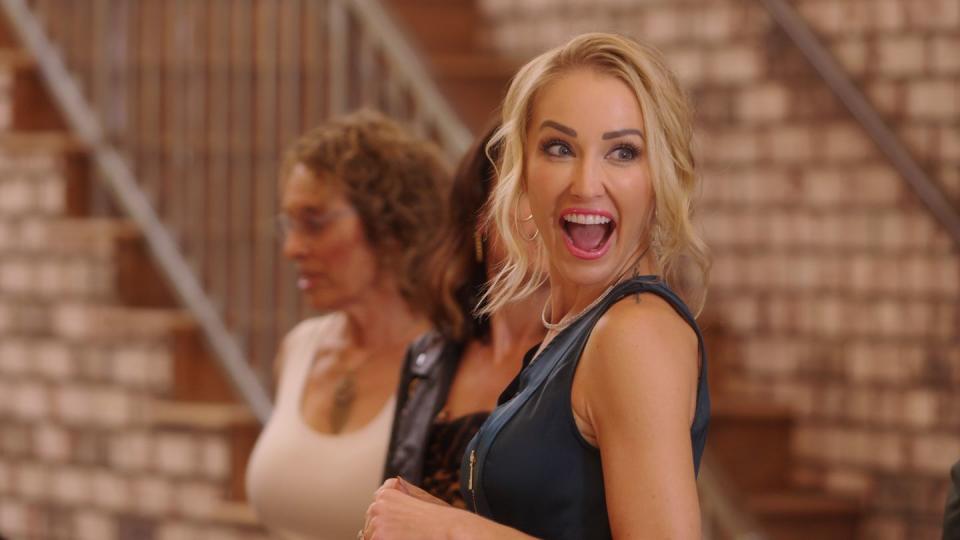
The two agents are working (really working; more on that later) from their office—socially distanced, responsibly (mostly) empty, exactly as it appears on camera—mid-day on a Monday in late August. Normally, late summer might be a quieter period for the Oppenheim Group, a luxury real estate brokerage that sells seven-figure-and-up homes with amenities that range from putting greens to guest houses larger than most people’s only houses. And during a pandemic, you might not expect anyone to be in the office at all, let alone two of the biggest reality stars of 2020. But the Oppenheim Group is a different kind of beast. Fans of Netflix’s sleeper hit Selling Sunset, a show about luxury L.A. homes and the lives of the women involved in those big-ticket transactions, have come to expect this heightened level of buying and selling from its stars; why should a global pandemic stop them in their tracks?
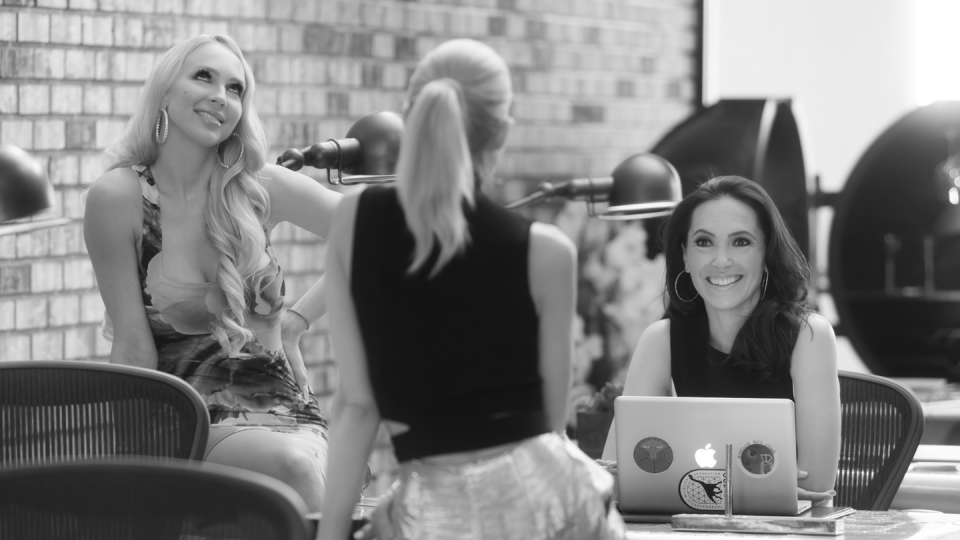
“We’re all still busy and we’re all still working—especially in California,” Heather Rae Young says a few days earlier from the Newport Beach home she shares with her fiancé, Tarek El Moussa, one of the stars of HGTV’s Selling Sunset competitor Flip or Flop. Mary agrees: “The market has gone crazy—especially homes that are $3 million and under. Everything's going over asking.”
There’s seizing the moment, and there’s whatever the cast and crew of Selling Sunset have done this year. Having quietly premiered its first season in 2019, Selling Sunset bookended this summer with two new seasons of the half house-porn, half “docusoap” (Netflix’s words) series that, as many Americans sat home looking to fill newly free hours with any healthy form of distraction from the horrors outside our windows, provided the perfect balance of cheese and charm. The Internet quickly began speculating ad nauseam about how “real” the show and its storylines are (more on that later, too). Selling Sunset is, in no uncertain terms, a phenomenon.
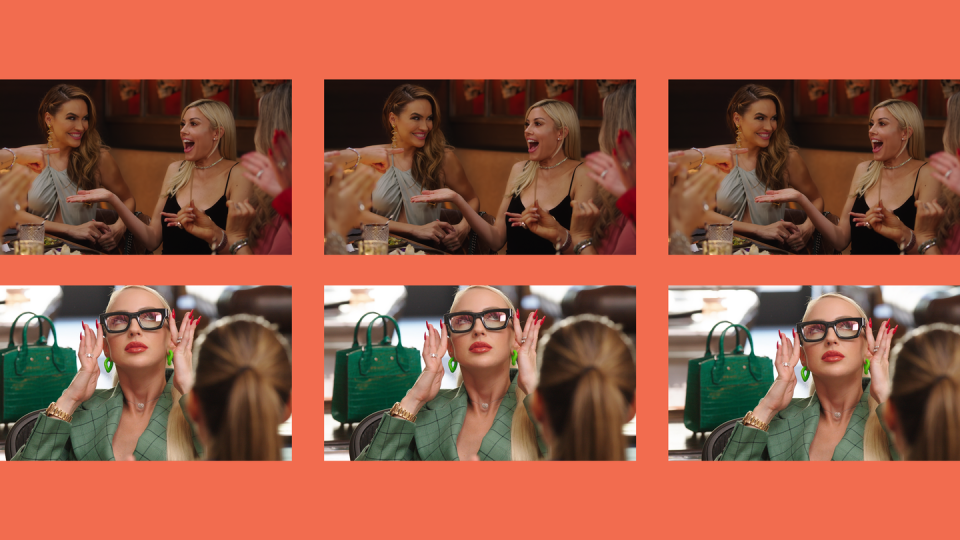
“On one hand, this show is not relatable—and on the other, it’s terribly relatable,” Jason says. “Maybe it’s that dichotomy that people relate to. We, like everyone else, deal with the normalcy and difficulties of life.” I catch a glimpse at the massive framed black-and-white drawing of a movie projector catching the sunlight behind him as he quietly picks at his afternoon snack.

Notably not in the office (and also scrubbed from the Oppenheim Group's website, and also absent from the otherwise extensive list of cast members Netflix offered Cosmopolitan access to...), for reasons fans are sure to dissect and obsess over in the absence of actual new episodes, is his equally likable twin brother and three-season co-star Brett. (See? Family discord: relatable!)
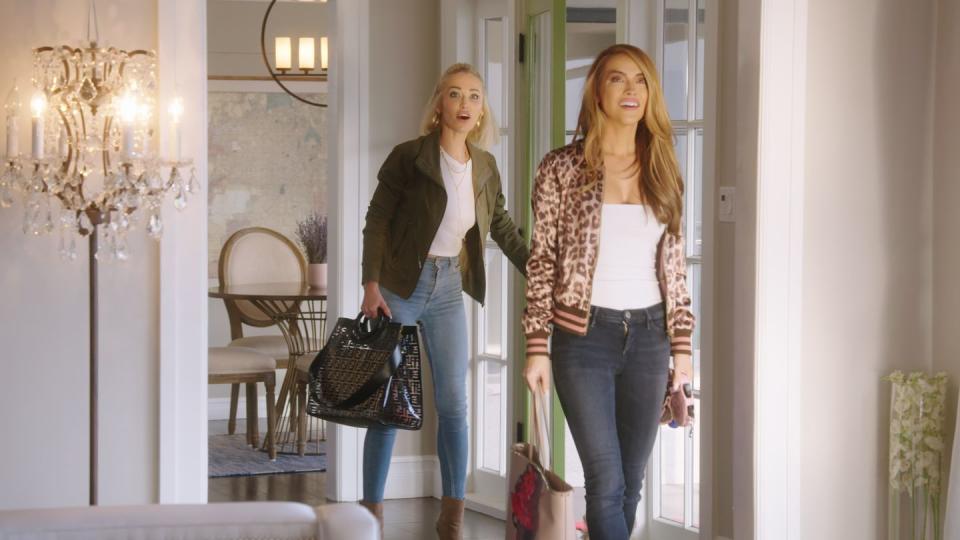
“We’re just normal people,” is how Heather puts it, her platinum-blonde pigtails framing her fully made-up face, her sparkling new diamond ring reflecting the sun peeking through her Pacific Ocean-facing windows. “When we filmed Season 1, we didn’t know if people would be interested in our lives.”
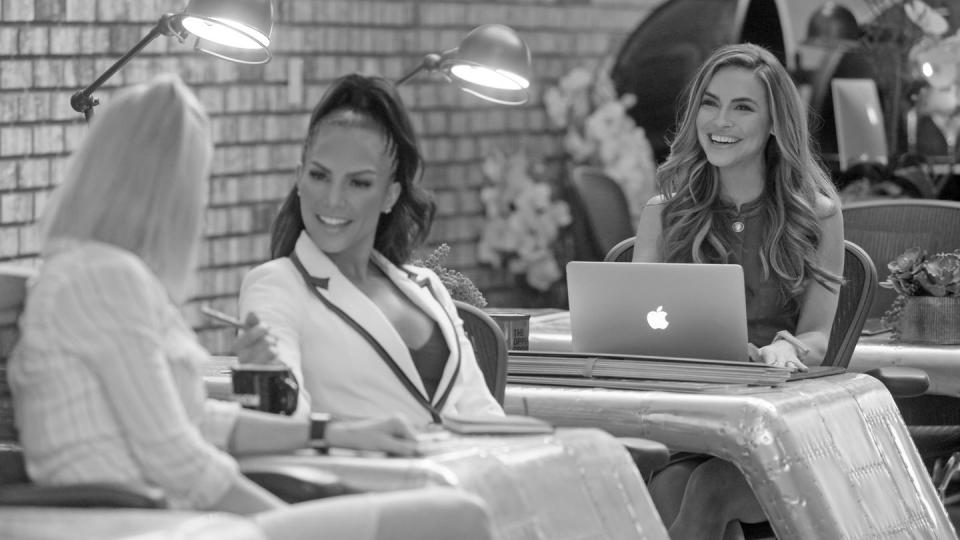
Not just people; celebrities. A-listers like Chrissy Teigen flocked to Selling Sunset in droves, which quickly cemented the series as must-see TV. Teigen even engaged in a back and forth with former soap star turned agent Chrishell Stause (who’s just joined the cast of Dancing With the Stars, if you needed more evidence of the show’s rise) about the “reality” of the docusoap. That led to two other stars of the show tweeting rebuttals, which led to actual-news-site CNN reporting on the back-and-forth. “Each time you see that, you’re kind of like, ‘holy shit,’’ Adam DiVello, the show’s creator, says. "When people tweeting about your shows are actual stories CNN is reporting on? Every day keeps surprising me more and more.”

Selling Sunset launched quietly on Netflix in March 2019 with an eight-episode season that quickly established its premise: twin brothers selling glitzy Hollywood houses to buyers with fur-lined pockets, from an office studded with beautiful, captivating female real estate agents at their service. A typical thirty-ish-minute episode seamlessly segues from house porn to tense work lunch to bigger house porn to tenser work dinner to opulent party, rinse, and repeat. The Group’s clients range from regular rich people, to barely famous rich people, to literally Orlando Bloom, who Jason Oppenheim says walked into the office to pick up keys to his new home during an early pre-production meeting. (The Netflix execs in the room were thrilled.)
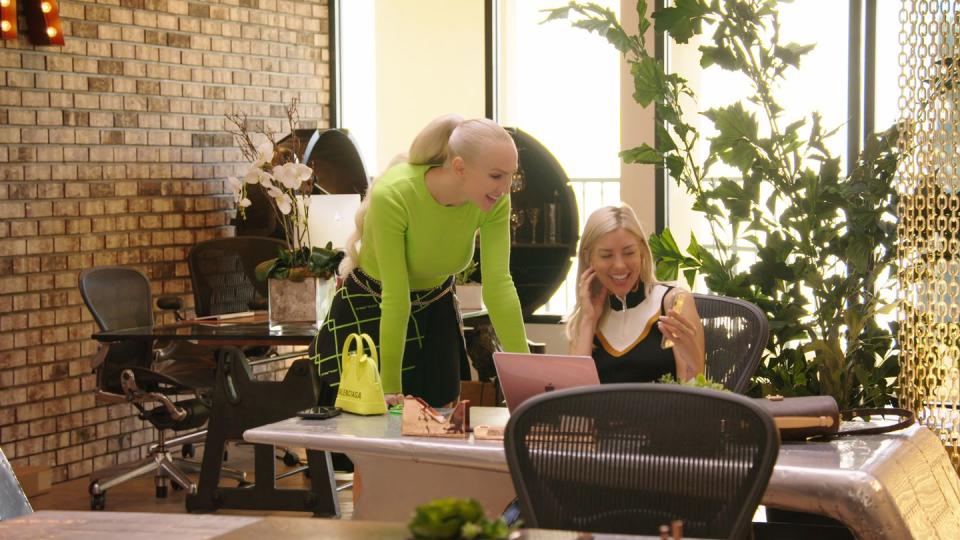
Jason says he’d been approached with multiple offers to film a reality show centered on The Oppenheim Group, but he didn’t bite until Adam—creator and producer of your MTV faves Laguna Beach, The Hills, and The City—came calling. Adam remembers stumbling upon Jason and the rest of the one-day Selling Sunset cast while flipping through an issue of The Hollywood Reporter one afternoon a few years ago. “Jason and his team had taken out a page that said ‘We are the Number One real estate team selling in the Hollywood Hills and the Sunset Strip’ and I was like, ‘This is the cast,’” he says. “I threw it on my development executive’s desk and said ‘Can you get a meeting with these people?’”

Within weeks, Adam was making his case at The Oppenheim Group’s flashy, brick-covered office. But it took some convincing. “I’m not someone who easily delegates or gives up control, especially when it comes to my business and my reputation,” says Jason bluntly, eyes laser-focused on mine through our screens. “I’m very protective of that. That was largely the reason for my previous reticence: the risk-reward analysis. I don’t need anything other than what I have. In retrospect, I think the reward has been exceptional. And I didn’t expect it would be so fun.”
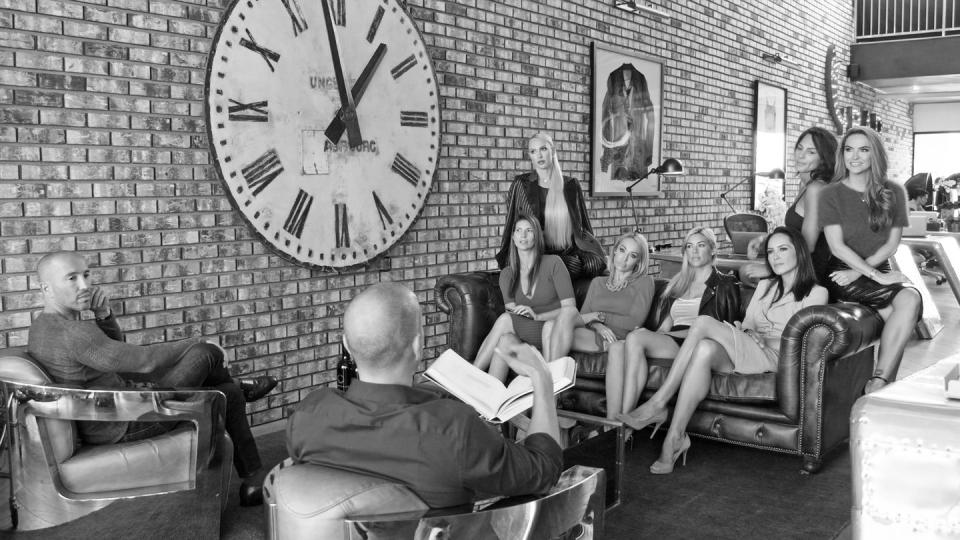
Season 1 establishes its cast quickly, including Chrishell, a newcomer to the brokerage in its first episode. We're with Chrishell at the office from day one, voyeuristically watching her attempts to maneuver the office’s well-established dynamics and unspoken but omnipresent hierarchies and cliques (“a perfect cast,” Adam says). Jason and Brett are equal parts demanding and supportive. Mary Fitzgerald, Heather Rae Young, and Maya Vander are the office’s Greek chorus, contributing to storylines and conversations without often ruffling feathers. Romain is Mary’s tall, sweet, and occasionally hot-tempered younger boyfriend (and, later, husband) who’s not above verbally tussling with the women. Davina Potratz is a recurring agitator, self-producing and pushing buttons like it’s her real job instead of selling houses.
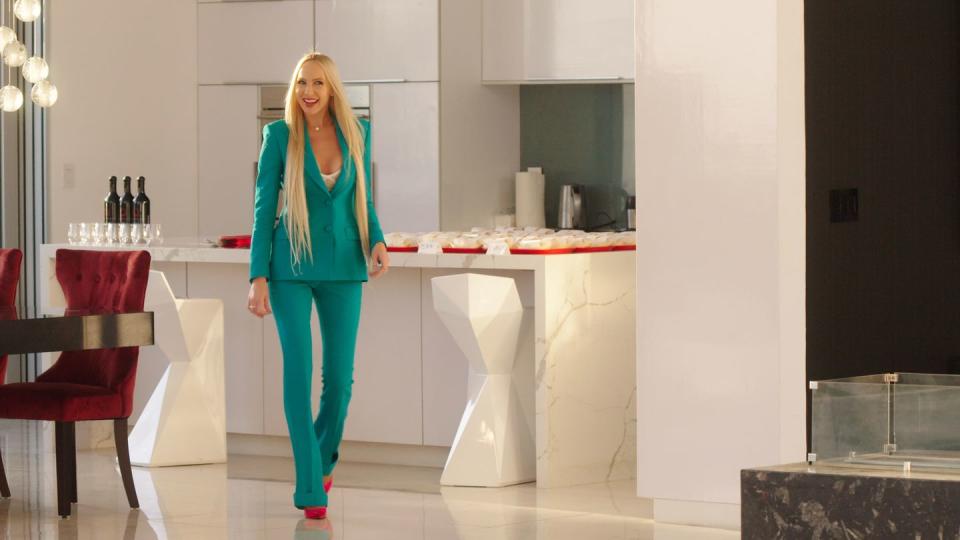
Then there’s Christine Quinn, the show’s only real “villain,” a seemingly sixteen-foot tall stunning personification of reality TV excellence. For Christine, more is more, whether that’s the height of her heels or the growing strength of the hold she has on nearly all of the show’s interwoven storylines.
Critics mostly ignored that first season; those who tuned in called it “very retrograde” (the kindest) and “unthinkable and offensive trash” (the harshest). But the feedback didn’t stop Netflix executives from ordering two more seasons, which filmed back-to-back through the first week of March 2020 and, this summer, launched a cottage industry around the show. There are endless recaps and explainers all over the internet (hi, yes, including on this very website); its stars now hawk sponsored products on their Instagrams; business is booming at The Oppenheim Group, demonstrably linkable to the show itself. It’s safe to say Selling Sunset is 2020’s biggest success story. But countless viewers (and this very writer) still want to know: how much of what we’re seeing is really real?

To hear the cast and crew tell it, there’s nothing about the show that’s “untrue.” But we know that's, um, maybe not the whole truth. Because the "truth" can be... complicated. Produced. Edited. Or...written? Apparently not. “People always ask: is it scripted, is it real?” Adam says, smiling. “Honestly, we really just have the reality gods working with us.” Sometimes producers “edit parts down” that end up not showing scenes’ full context, says Mary, but then again, “no one wants to see us just sitting on our computers, working and being silent.” Sometimes the women are prompted by producers to have conversations on camera they tell me they’d prefer not to. Pre-season meetings require the cast members to talk about developments in their lives and “storylines” that happened in the off-season while detailing what they might have going on during shooting. But when cameras start rolling, “you're kind of on your own,” Chrishell says. “I remember there being several times I was like, ‘Wait, do we just keep going?’ And they kept telling me, ‘Chrishell, just act like we're not here.’ There's a learning curve that comes with living your life on camera, but they want to tuck away and be unnoticed—as much as that's possible.”
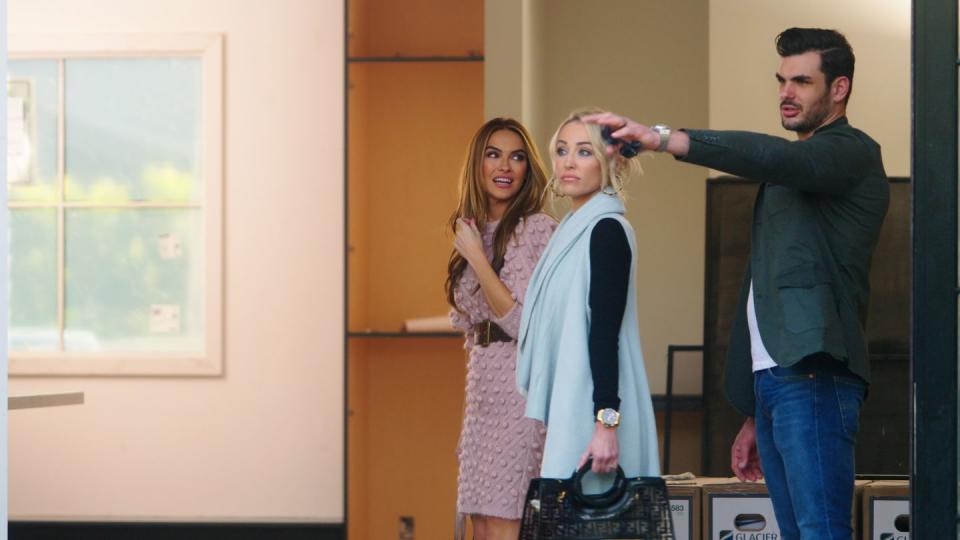
The show films from Tuesday through Saturday each week for eight months at a time. Five days a week, the women say they put their full, true lives on camera. That means discussing some of life’s ugliest moments: divorce, miscarriage, spousal deception, infighting, Davina’s Season 2 fashion sense, jealousy, poverty, single parenting, and more. In just the eight episodes of Season 3, viewers watched Amanza Smith Brown’s ongoing struggles in co-parenting her children with an absent father, and Chrishell’s tabloid-fodder divorce from This Is Us star Justin Hartley—it’s the kind of stuff, in Adam’s words, “you couldn’t possibly script.”
But in addition to selling you the titular Sunset, the show must also, by its very nature, sell you the fantasy. The fantasy of wealth. Of luxury and glamour. Of escapism. Of drama. Of Hollywood the way you see it in the movies. Of a group of women that are family, not casted. On Selling Sunset, things might not be scripted, but the tensions are certainly heightened with music cues, camera angles, and editing, to thrilling effect. That’s how shows like this work.
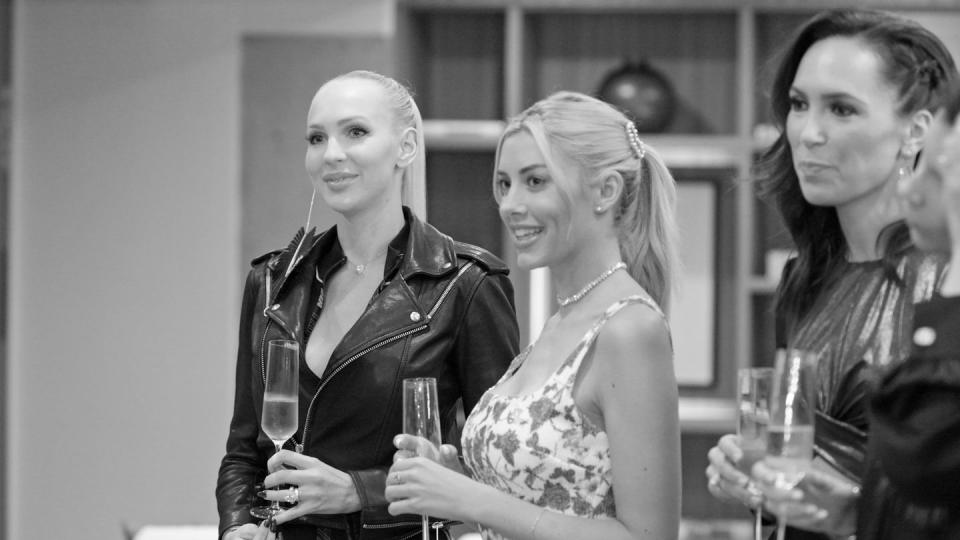
Naturally, with more time to spare (for those responsible enough to still be staying home six months into a global pandemic), audiences have rabidly devoted themselves to “uncovering” the illusion. Fans of the popular quarantine gossip Instagram @deuxmoix have witnessed a blind item blizzard of “are they or aren’t they” speculation surrounding the cast’s real estate licenses. Chrissy Teigen’s Twitter thread hinged on the fact that the star and her team haven’t ever seen Oppenheim Group agents in action. (Jason responded on Twitter, and again in a longer statement, with receipts: “My team works tirelessly and if their real estate successes don't precede them yet, they will. Remember their names. And feel free to come by the office and say hi.”) Just last week, Vanity Fair breathlessly dedicated thousands of words to pulling on the seams of Christine’s husband’s backstory. And, yes, there are even TikToks dedicated to “exposing” houses featured on the show, clips that purport to show the “real owners”—suggesting the high-stakes buying and selling that makes the show so sexy and exciting might be (gasp!) heightened or fabricated for the cameras.
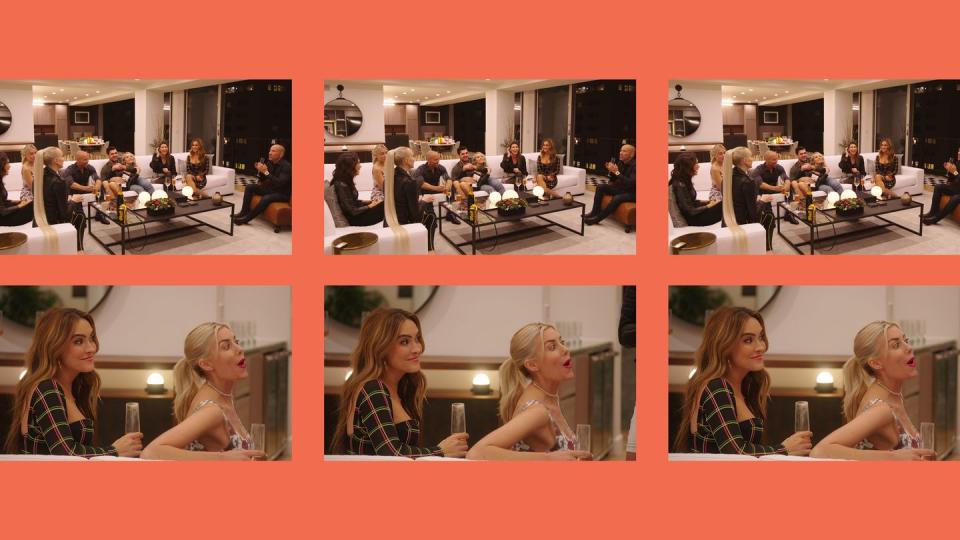
And even though people are spending their free time trying to poke holes in the show’s canon, at least people are talking about Selling Sunset at all. It’s a glamorous portrait of the ultra rich and famous, a love letter to Los Angeles, a character study of some of the city’s most intriguing, relatable, and unrelatable residents, and adrenaline-pumping escapism all wrapped neatly into bingeable parcels that clock in under 40 minutes. Its characters give us reasons to root for or against them in every episode.

“For me, I am who I am, on camera and off,” Jason says. “You’re seeing me. I own that. You don’t have ultimate control in the edit bay, but they also certainly can’t make me say or do anything. I’m in ultimate control of that.”

Which seems...reasonable, yes, sure. But at least one of the show's stars seems hellbent on shattering the illusion in recent weeks. During a promo run for the most recent season, Christine had some choice words for producers: “There were a lot of fed lines… I was really, really surprised going back watching things because they really did me dirty,” she told Nylon in August. (Netflix declined to make Christine available to participate in this story days after the star told The Daily Beast she’d been “fuckin’ bodyslammed and fired from the press tour” after her Nylon interview.)
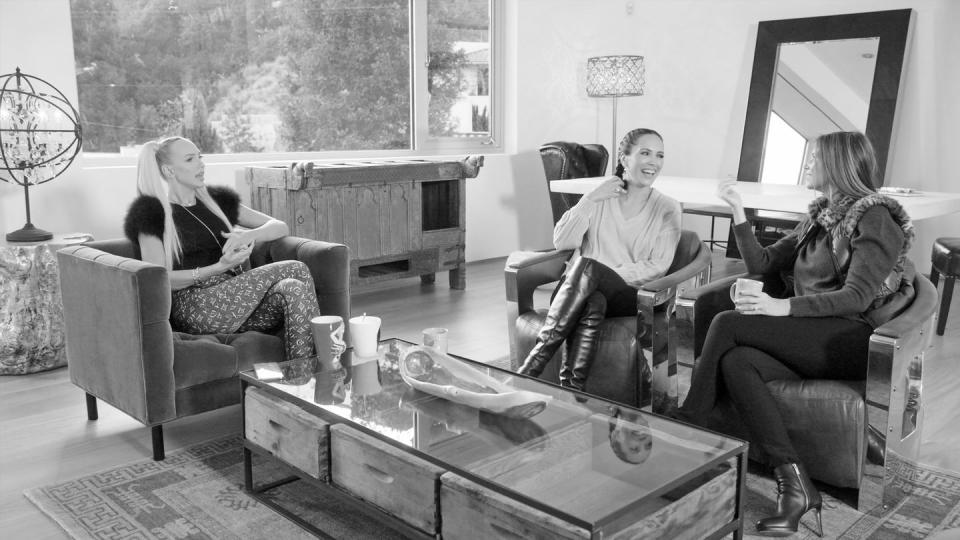
“Even off-camera, things are changing constantly,” Heather says, her Zoom camera angle showcasing a piece of wall art that reads “I Love You Too Honey Bunny,” upstairs at her Newport Beach home. It's the kind of mass-appeal, stylish-but-inoffensive piece that you could easily picture adorning the walls of an expertly staged listing. “These are real relationships. These are real friendships. We get in real fights. When the cameras turn off, our lives don’t turn off. But the audience doesn’t see past what they see on TV.”
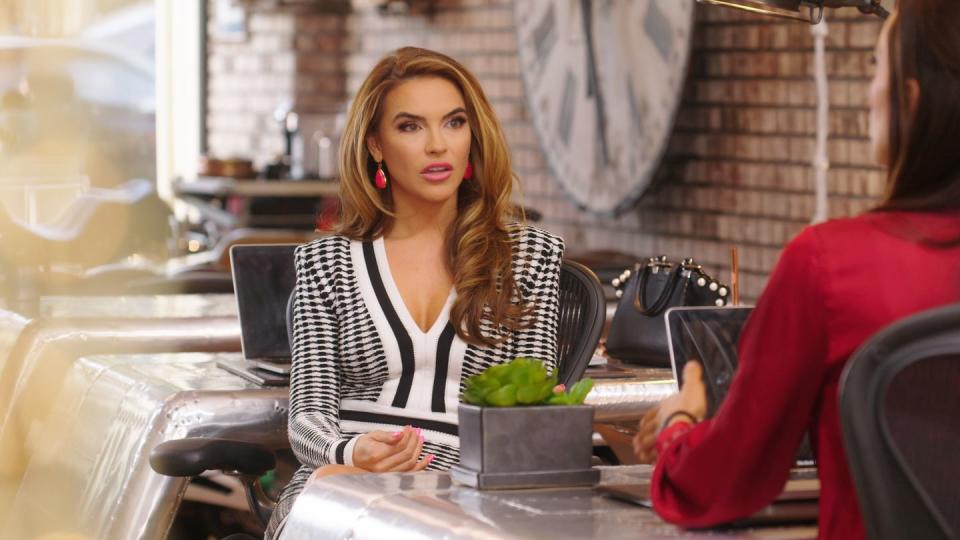
From the early days of Season 1, fans also took notice of Selling Sunset's lack of diversity. "There are 11 agents working at the firm — it just appears Selling Sunset chose to cast the whitest and blondest of the lot," one critic wrote in 2019. Even Christine has chimed in on the issue, telling Vogue UK recently, "Inclusivity and diversity are important to me, so I want to work on all of those aspects that come with having a company before I throw something into the world."
In Season 2, Amanza Smith Brown—former Deal or No Deal briefcase model, longtime friend to multiple cast members, and frequent home stager for the Oppenheim Group—joined the show as an agent, becoming Selling Sunset’s only Black cast member. “Because I've been best friends with these guys for so long, everybody else noticed the color of my skin more than me,” she says, laughing, in full, gorgeous glam from her Sherman Oaks home. “It wasn't like, ‘Oh, the new token Black friend.’ I brought some of these people together. But I’ve been joking with Jason like, ‘Hey, you're welcome.’ Because if they hadn't added me to the show, in this environment, I think that they would have gotten a lot of backlash.” She pauses and smiles. “Or blacklash.”
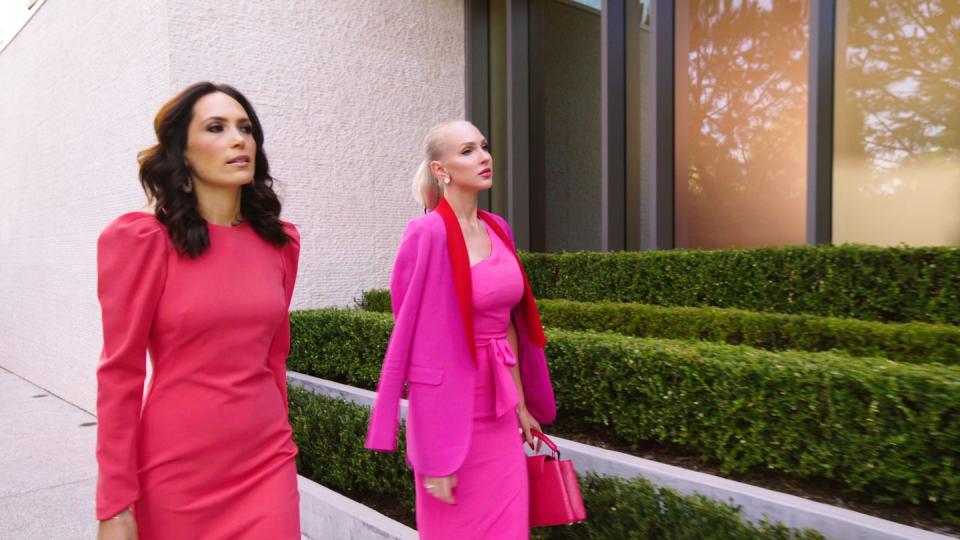
Throughout its three seasons, Selling Sunset cast members attend each other’s most intimate, personal events, including wedding dress fittings, courthouse visits, bachelor and bachelorette parties, and (of course) "Burgers and Botox"-themed open houses. There’s something to be said about the wholly organic-feeling dynamic of the group that, when they tell you they can’t fake drama this good and relationships this lasting and deep, you find yourself believing them. “I introduced Mary to Jason,” Amanza says. “They ended up dating. When they broke up, she came and lived on my couch. When my kids were with their dad, I would go over and stay all night with Mary and Romain, and I'd wake up like, ‘Hey guys, what's for breakfast?’"

“It feels like a partnership,” Chrishell clarifies, punctuating each remark with a pause for emphasis. “It feels like we all want the show to be great. It feels like Adam and his team are rooting for you. I don't feel like these are reality producers that are rooting against you or want to see you fail. Maybe that's naive of me to say, I don't really know, but it really does feel like, at this point, we're a dysfunctional family in the best way possible.”
“But there are times that you win, and there are times that you don't,” she adds with a resigned sigh. “And I feel like the camera captures all of that. With scripted television, there are no surprises. There can't be.”

Fans of the show and tabloid readers alike know about the show’s biggest storyline to date: Chrishell’s divorce via text, which dominates the back half of Season 3. At Christine’s opulent wedding, fellow cast members (read: Davina) suggested that we might not know the whole story, that there are two sides to every divorce, and that we can’t take Chrishell at her word. In other words: in an Inception-level twist, Selling Sunset cast members began doubting the reality of the very show they were on while filming said show.

“In the beginning, I was so terrified and embarrassed and humiliated," Chrishell says, parceling out her words as she tiptoes carefully through her thorny storyline. "To live through that pain and to have people connect with it and feel like I'm somehow helping them really does give a purpose to the pain. For better or for worse, people relate to that stuff because it's real—because it really happened. Even though it's on a more exaggerated scale, at the end of the day, when you break it down, people are all the same. Heartbreak is all the same.”
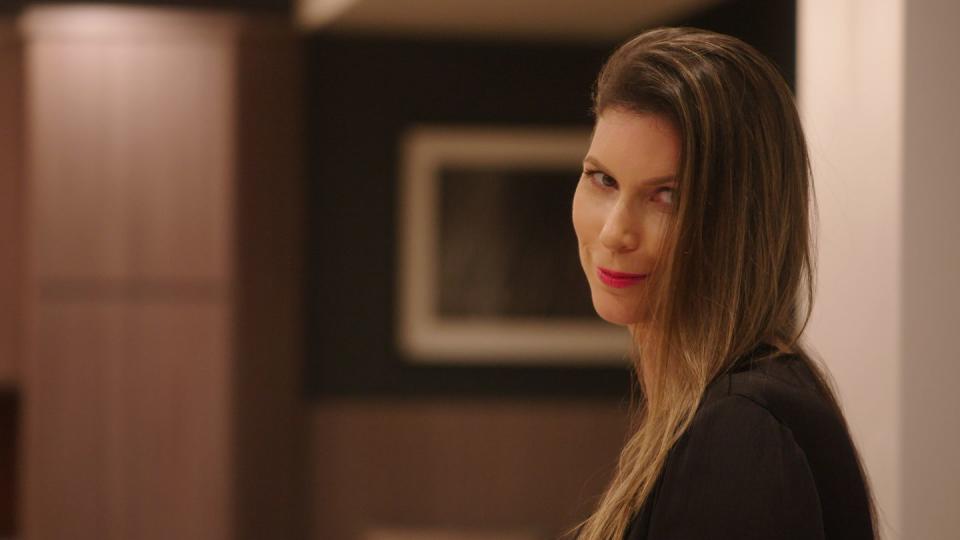
“Listen, with a show like this, there are bound to be people who are never going to believe that this is really who we are,” she adds. “They're always going to think it's scripted, and they're entitled to that. But I've worked in scripted television. To be able to get people to be this natural and just speak off the top of their head… if that was scripted, it would be impossible.”

Netflix has yet to publicly renew Selling Sunset for a fourth season, and if they’ve done so privately, the show’s stars certainly aren’t saying. But they’re all (mostly) working, And they’ve all noticed an uptick in interest—from buyers and sellers both—in working with The Oppenheim Group on- or off-screen. “Everyone knows who we are,” Mary says. "We're the go-tos for L.A. real estate, so now they call us up.”
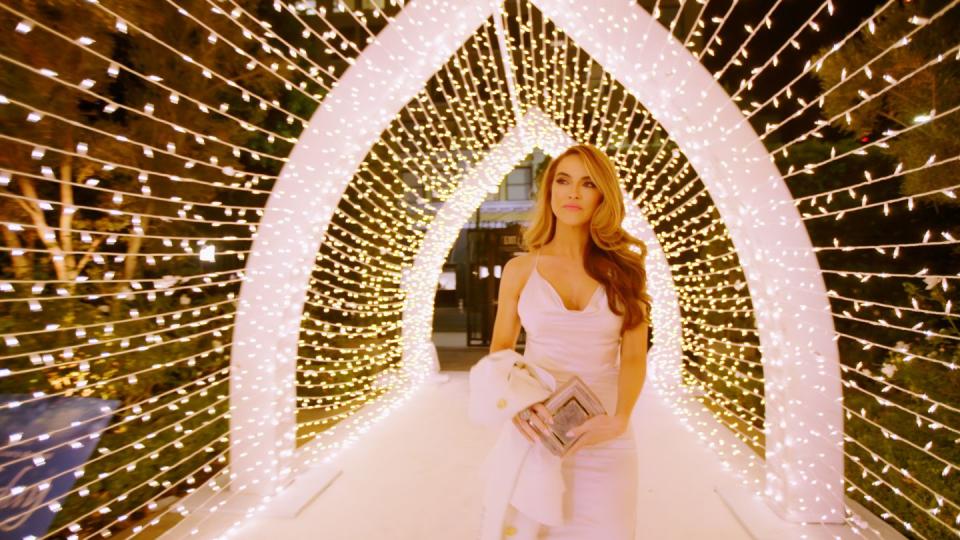
Though the physical office is less populated than it was six months ago, tourists are still flocking to the Sunset Strip headquarters en masse. “It's almost like an assembly line on some days, where people will drive by really slowly in front, taking pictures,” Mary says, gesturing to the window that overlooks the heavily trafficked street. “People come up to the door and ask for photos. We’ve had people lined up to take pictures with us. We were like, ‘What is happening right now?’”
Besides the awe at tourists' interest, one thing that comes up in every cast interview I do, without prompting, is that “we’re a show centered around women and that’s really empowering,” Heather says. “It shows that women can work our butts off and be successful. I love showing the world that.”
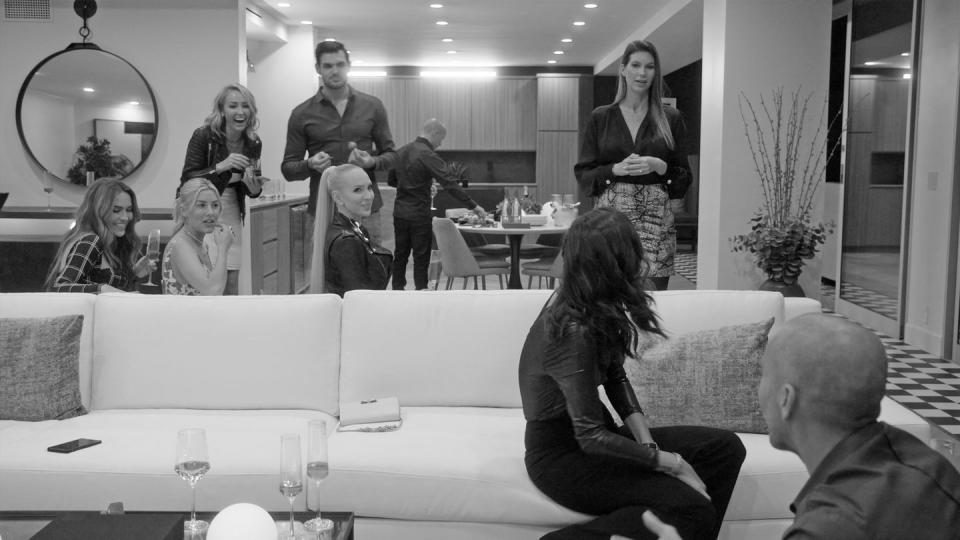
Each woman is thrilled to point to it when asked about the driving force behind the show’s recent success. “It's great to watch all these women dominate a career that, for a lot of the past, has really exclusively seen men on television doing it,” Chrishell says. “There's a lot of women doing this. It was always so misrepresented on television!”
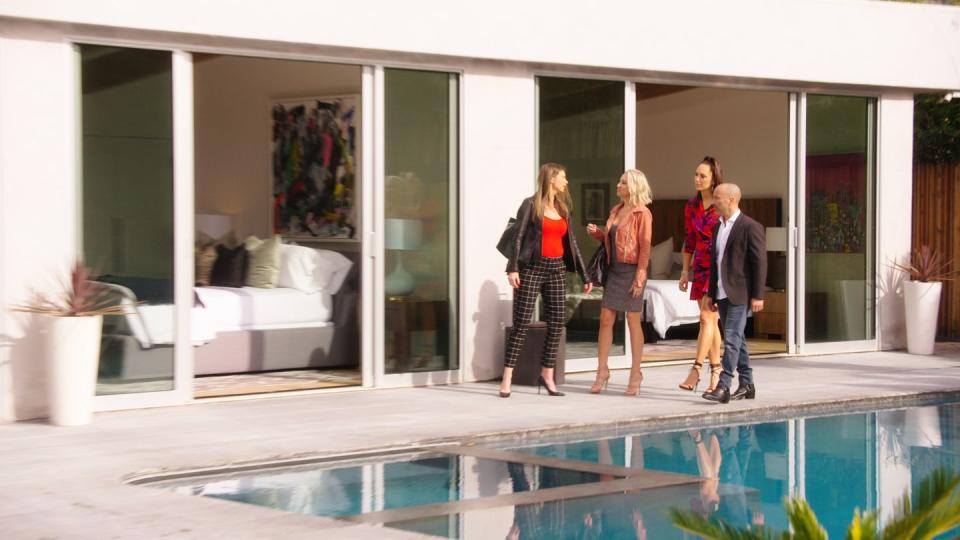
“I always prefer real estate over drama,” Mary adds with a smile, gesturing towards the papers on her desk moments after she hangs up her work-work call and returns to chatting with me. “But this is what we all signed up for.”
Because at the end of the day, Selling Sunset is a very real job for these women. They’re doing their jobs when they’re buying and selling houses, and they’re doing their jobs when they’re fighting about who said what about whom. The balance of high-wattage houses and high-voltage drama is the key to the show’s success. When the women discuss the show and the role their coworkers play, despite the fights, the drama, and the tweets, they all speak glowingly of each other. There's no slickness to their praise, no media-trained smile-and-nods and get-this-over-withs; the admiration they have for each other and the roles they all play feels genuinely real. Jason and Brett may own the Oppenheim Group, and Adam may make the show, but the women of Selling Sunset are the pumping life force that keeps the series afloat. They're the ones that are provide viewers with a product both aspirational and relatable, a combination of heightened beauty and everyday struggles. "When we get along, we get along so well," Chrishell says with a knowing laugh. "There are times where we're really great and then there are times that we aren't. But at the end of the day, it is who we are."
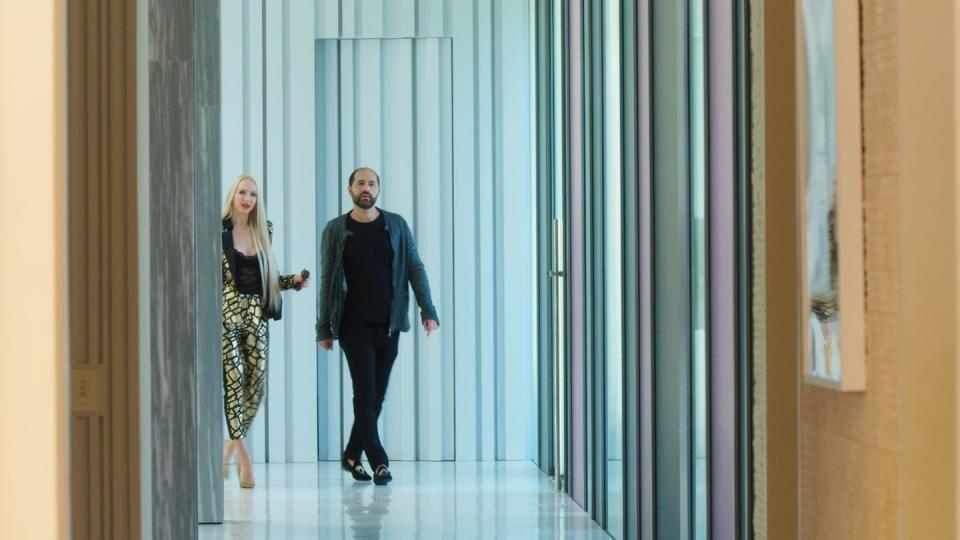
Selling Sunset stopped filming a week before the pandemic gripped the United States. “I wish we had made 300 episodes,” Adam says with a laugh. “Had we known, we could’ve rolled out ten seasons of this.” For now, we have 24 perfect episodes of TV to watch again and again, three seasons that provide more entertainment value in a short while than most long-running reality shows do throughout their entire runs. And though cameras have remained off while the real estate office has semi-reopened, and houses are being shown, and Heather got engaged, and one Oppenheim (Brett) reportedly left the Oppenheim Group to start his own agency while the other Oppenheim (Jason) soldiered on, and Amanza began shepherding her kids through remote learning, and Chrishell started hunting for the perfect house for herself now that she’s single, fans have waited patiently. As long as there are houses, fantasies, and Sunsets to sell, as long as this group of women continue to deliver, we’ll keep waiting.
Photos: Lindy Lin; Art: Abby Silverman
You Might Also Like

